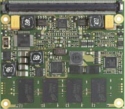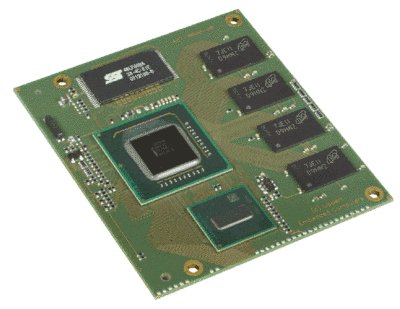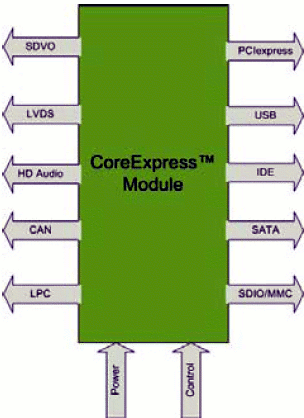Claimed-first Menlow board debuts
Feb 22, 2008 — by Eric Brown — from the LinuxDevices Archive — 2 views Lippert Embedded Computers has released what it says is the first board based on Intel's Menlow chipset. The Linux-compatible CoreExpress-Menlow module is also the first in Lippert's newly announced 65 x 58mm CoreExpress processor module format, aimed at automotive, medical, mobile, and… point-of-service/interface (POS/POI) devices.
Lippert Embedded Computers has released what it says is the first board based on Intel's Menlow chipset. The Linux-compatible CoreExpress-Menlow module is also the first in Lippert's newly announced 65 x 58mm CoreExpress processor module format, aimed at automotive, medical, mobile, and… point-of-service/interface (POS/POI) devices.
(Click for larger view of the CoreExpress module)
digg this story |
Measuring 65 x 58 mm (about 2.6 by 2.3 inches) the new CoreExpress module format (pictured at left and below) is smaller than a credit card, and roughly the same size as Via's smallest ITX mainboard format for cell phones, the 75 x 45mm Mobile-ITX. According to Lippert, a Mannheim, Germany-based embedded computer manufacturer known for products such as the Hurricane-PM EPIC single-board computer (SBC) and the Cool Roadrunner PC/104-Plus module, the CoreExpress format is made possible by the compact format of the Menlow chipset, but will be able to work with other nano-scale processors as well. “Menlow,” a branding term similar to “Centrino,” encompasses Intel's Silverthorne processor and Poulsbo companion chip, together with a variety of optional storage, WiFi, GPS, and other peripheral chips.

CoreExpress-Menlow Module
The CoreExpress format is said to weigh only 26 grams, including its soldered RAM. It lacks analog interface signals like VGA or Ethernet, or any legacy I/O, such as PS2, speaker, and similar peripherals. The format is said to be suitable for automotive, medical and mobile devices, as well as POS retail devices and POI (point of interface) telecom applications.

Lippert's CoreExpress “standard”
(Click to enlarge)
It is unclear if Lippert plans to push CoreExpress as a formal specification. However, Lippert's Matthias Fellhauer sits on the PC/104 Consortium board and has actively pushed the limits of the PC/104 standard in the past.
CoreExpress-Menlow Module
Based on the Menlow chipset, the CoreExpress-Menlow module is said to sip power at very low rates while running at clock frequencies as high as 1.5GHz. The module includes 1GB RAM, digital panel connections, and HD audio, says the company. It is said to support PCI Express lanes plus several USB 2.0 ports, IDE, or SDIO/MMC interfaces.
The CoreExpress-Menlow's tiny heat sink doubles as an electromagnetic shield, thereby streamlining system integration, says the company. The module supports a temperature range of -40 to 185 degrees F (-40 to 85 degrees C). It includes a separate microcontroller that supports features such as a 128-bit security key, temperature recording, and recording of operating hours. The microcontroller also supports flash memory and fail-safe BIOS functions.
The module appears to be the first formally introduced Menlow product. However, Elektrobit (EB) informally announced that it will introduce a WiMax-enabled Mobile Internet Device (MID) based on the chipset later this year.
Lippert is providing a hardware/software evaluation kit for system integrators that includes the CoreExpress-Menlow module mounted on an EPIC carrier board, thereby providing standard PC connectors and PC/104(-Plus) expansion. The CoreExpress Evaluation Kit includes a Board Support Package (BSP) with documentation for the selected operating system (OS), including Linux, Windows XP, Windows XP Embedded, and Windows CE.
Availability
Lippert did not provide pricing or availability information on the CoreExpress-Menlow, but more information may be available on a website launched around the CoreExpress format. Lippert will be demonstrating the CoreExpress-Menlow at Embedded World 2008, to be held at the Exhibition Centre Nuremberg in Nuremberg, Germany on February 26-28. The company will also be showing a new member of its Thunderbird family of Mini-ITX boards that offers a universal I/O interface called FlexIO.
This article was originally published on LinuxDevices.com and has been donated to the open source community by QuinStreet Inc. Please visit LinuxToday.com for up-to-date news and articles about Linux and open source.